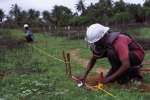- Text size
 |
|  |
|  |
| 
- Français
UNHCR and Rwanda seek enduring solution for protracted refugee situation
News Stories, 20 October 2009
KIGALI, Rwanda, October 20 (UNHCR) – UN High Commissioner for Refugees António Guterres and Rwanda's President Paul Kagame agreed here Tuesday to work towards resolving the country's protracted refugee problem by the end of 2011.
"I have no wish for anyone to live like a refugee," Kagame told Guterres, who is here on an official visit to review UNHCR's operations and to discuss a proposed road map that the High Commissioner described as "a proper and effective conclusion" of the refugee situation.
The road map, which will include specific actions and benchmarks, is part of an initiative by UNHCR to push for the closure of the refugee chapters in Rwanda, Burundi, Angola and Liberia. It ultimately will entail invocation of the cessation of refugee status clause for exiles of these countries. Guterres discussed this on Monday with Local Government Minister Christopher Bazivamo.
The two sides also looked at possible measures to boost repatriation, implement effective reintegration solutions and deal properly with the residual protection cases for those who will remain in exile. "The Government of Rwanda reiterated its commitment to receive all Rwandan refugees who opt to return to their motherland," said a joint communique, adding that programmes and mechanisms had been put in place to absorb these refugees.
Millions of people, mainly ethnic Hutus, fled Rwanda after the bloody ethnic conflict of 1994. Since then, 3.4 million refugees have returned, including at least 300,000 with help from UNHCR. But 60,000-65,000 Rwandans still live in asylum countries, including Burundi, the Democratic Republic of the Congo (DRC), and Uganda.
The government has long called for the cessation of refugee status, saying peace has returned to the country and refugees have nothing to fear. Guterres stressed that UNHCR would work with Rwanda and other stakeholders, including host countries, to resolve the problem. "We will help every Rwandese to return and reintegrate in safety and dignity," he pledged.
He encouraged more voluntary repatriation and called upon Rwanda to establish effective reintegration activities. The process could be accelerated by mass information campaigns to ease the fears of those considering return before the cessation clause is invoked.
The High Commissioner said this would include "go-and-see" visits, so that refugees could judge the situation for themselves and then tell their families and friends.
UNHCR, Rwanda and host countries will regularly meet to discuss progress before cessation is declared and to explore ways of encouraging refugee returns over the next two years. This will include meaningful reintegration assistance packages and special attention to people with specific needs.
Guterres said he was particularly concerned about the situation of Rwandan refugees in eastern DRC, where their human rights were threatened because of continuing conflict. He said the unstable situation was also preventing people from going back home from the DRC.
During his visit to Rwanda, Guterres is also holding meetings with the donor community, heads of UN agencies and NGOs to explain the timetable for cessation and to win support for a common approach. He is scheduled to meet Congolese refugees at Nyabeheke camp in the eastern province of Gabitso before flying to Uganda to attend an historic African Union summit on forcibly displaced people.
By David Nthengwe in Kigali, Rwanda











































